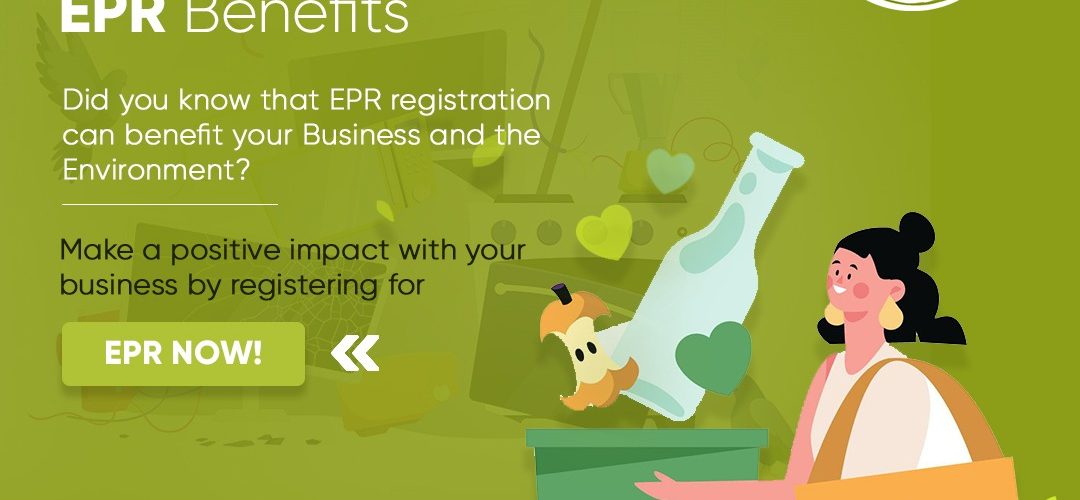As a business owner, you might be wondering why you should bother registering with Extended Producer Responsibility (EPR) regulations. Compliance with EPR regulations can have numerous benefits for your business, from improving your reputation to promoting sustainability and reducing waste. In this article, we will discuss the top benefits of EPR registration for your business.
What is EPR?
Extended Producer Responsibility (EPR) is a waste management policy that shifts the responsibility of managing end-of-life products and packaging from taxpayers to producers. EPR regulations require businesses to take responsibility for the entire lifecycle of their products, including design, production, and disposal.
Benefits of EPR Registration
Improved Reputation
Compliance with EPR regulations can help improve your business’s reputation as a socially responsible and environmentally conscious company. By taking responsibility for the end-of-life management of your products, you demonstrate your commitment to reducing waste and minimizing your environmental impact. This can help you attract customers who are environmentally conscious and socially responsible.
Compliance with Legal Requirements
EPR regulations are mandatory in many countries and regions, and compliance is a legal requirement. Failure to comply with these regulations can result in fines, legal action, or revocation of your business license. By registering with the relevant regulatory body and complying with EPR regulations, you can ensure that you are operating legally and avoid costly penalties.
Cost Savings
Complying with EPR regulations can also help you save money in the long run. By implementing sustainable product design and reducing the amount of packaging you use, you can reduce your production costs and increase your efficiency. Additionally, collaborating with other businesses to share the cost of end-of-life management can also help reduce your costs.
Innovation
Complying with EPR regulations can also encourage innovation in sustainable product design and end-of-life management. By taking responsibility for the entire lifecycle of your products, you are incentivized to design products that are easier to recycle or dispose of at the end of their life. This can lead to new business opportunities and improved competitiveness in the market.
Promoting Sustainability
By complying with EPR regulations, your business can promote sustainability and reduce waste. By taking responsibility for the end-of-life management of your products, you can ensure that they are disposed of in an environmentally friendly way. This can help reduce the amount of waste that ends up in landfills or pollutes the environment.
Conclusion
Complying with Extended Producer Responsibility (EPR) regulations can have numerous benefits for your business, including improved reputation, compliance with legal requirements, cost savings, innovation, and promoting sustainability. By taking responsibility for the entire lifecycle of your products, you can demonstrate your commitment to reducing waste and minimizing your environmental impact. If you haven’t already, consider registering with the relevant regulatory body to comply with EPR regulations and reap these benefits.
FAQs
Which products and packaging are subject to EPR regulations?
EPR regulations vary by country and may cover different types of products and packaging. However, common items that are subject to EPR regulations include electronics, batteries, packaging, and household hazardous waste.
Is EPR only for large businesses?
No, EPR regulations apply to all businesses that produce and place products on the market, regardless of their size.
Can businesses opt-out of EPR?
No, businesses cannot opt-out of EPR regulations if they produce and place products on the market that are subject to the regulations.
What happens if a business fails to comply with EPR regulations?
Penalties for non-compliance with EPR regulations vary by country and may include fines, legal action, or revocation of the business’s license to operate.
How can businesses reduce the cost of complying with EPR regulations?
Businesses can reduce the cost of complying with EPR regulations by implementing sustainable product design and reducing the amount of packaging they use. They can also collaborate with other businesses to share the cost of end-of-life management. Additionally, businesses can explore innovative solutions such as recycling and reusing materials to reduce waste and costs.
How does EPR benefit the environment?
EPR benefits the environment by reducing waste and promoting sustainable practices. By taking responsibility for the entire lifecycle of their products, businesses can design products that are easier to recycle or dispose of at the end of their life. This can help reduce the amount of waste that ends up in landfills or pollutes the environment.
How does EPR benefit consumers?
EPR benefits consumers by promoting sustainable products and reducing waste. When businesses take responsibility for the end-of-life management of their products, they are incentivized to design products that are easier to recycle or dispose of. This can result in more sustainable products that are better for the environment and safer for consumers.
What is the process for registering with EPR regulations?
The process for registering with EPR regulations varies by country and region. Generally, businesses need to identify the relevant regulatory body and complete an application process to register. They may also need to submit reports on their product and packaging data and their end-of-life management practices.
Can EPR help businesses save money?
Yes, complying with EPR regulations can help businesses save money in the long run. By implementing sustainable product design and reducing the amount of packaging they use, businesses can reduce their production costs and increase their efficiency. Additionally, collaborating with other businesses to share the cost of end-of-life management can also help reduce costs.
How can businesses ensure they are complying with EPR regulations?
Businesses can ensure they are complying with EPR regulations by identifying the relevant regulatory body and familiarizing themselves with the specific requirements for their products and packaging. They can also work with consultants or advisors who specialize in EPR compliance to ensure they are meeting all the requirements. Additionally, regular reporting and monitoring of their end-of-life management practices can help ensure ongoing compliance.



